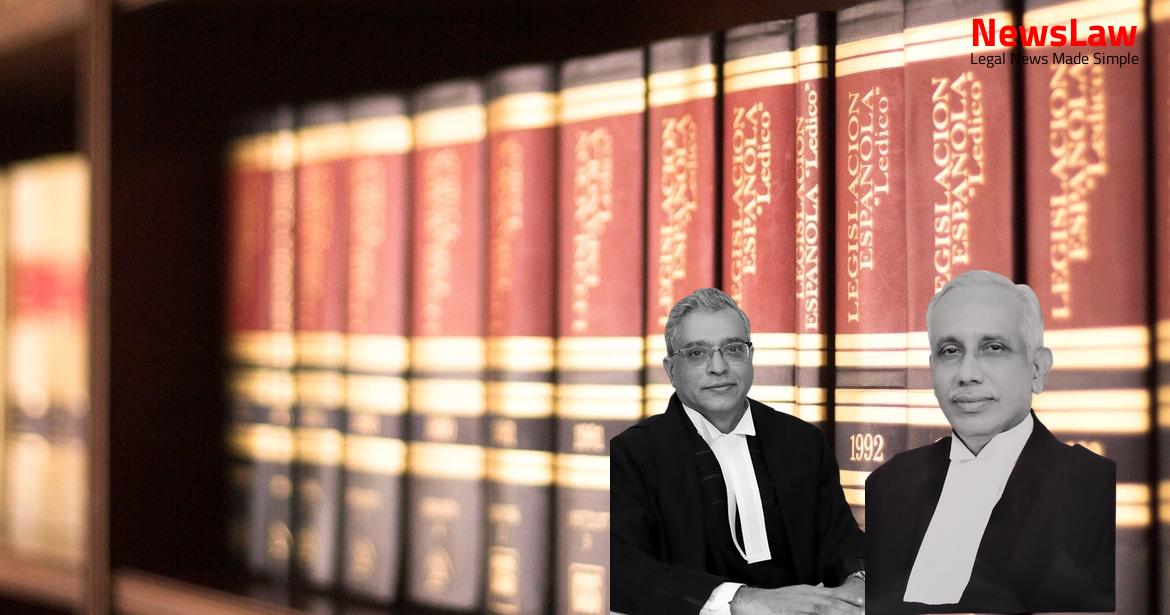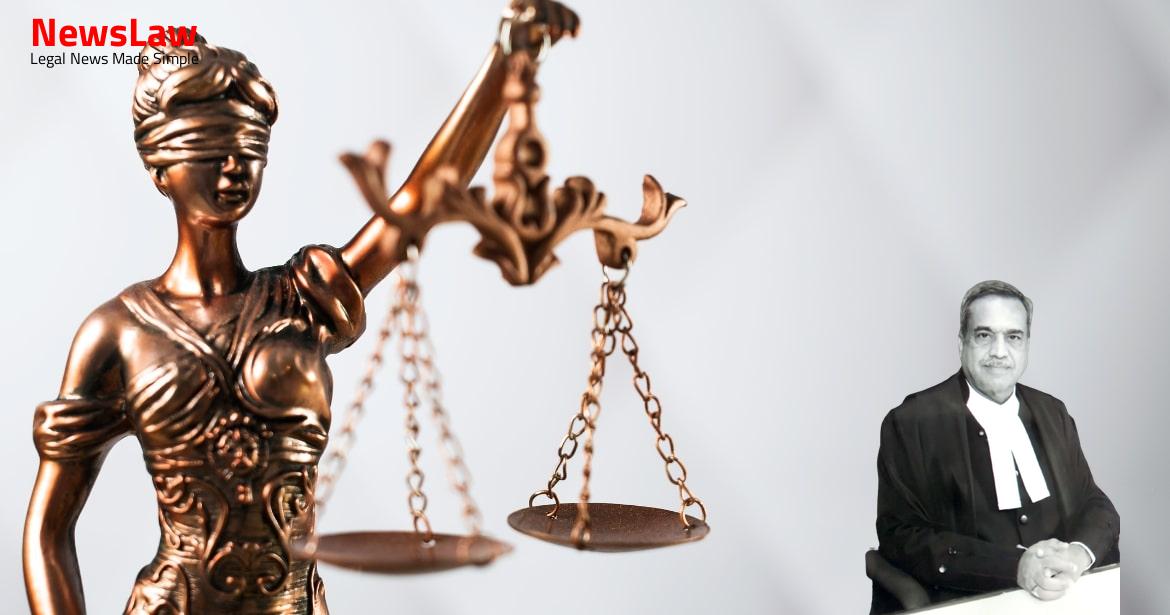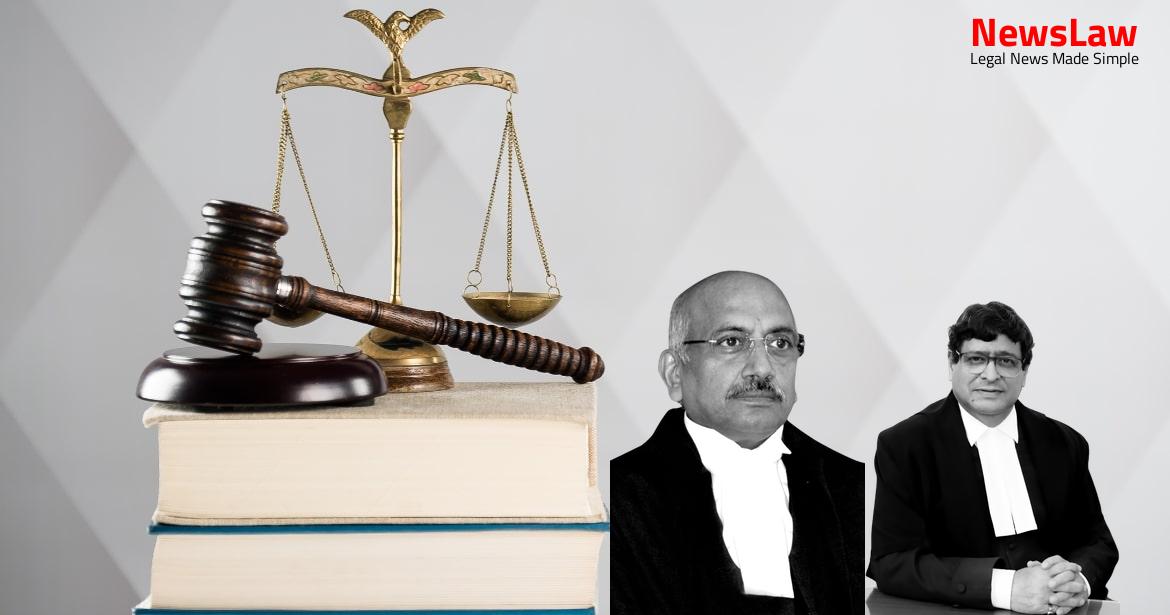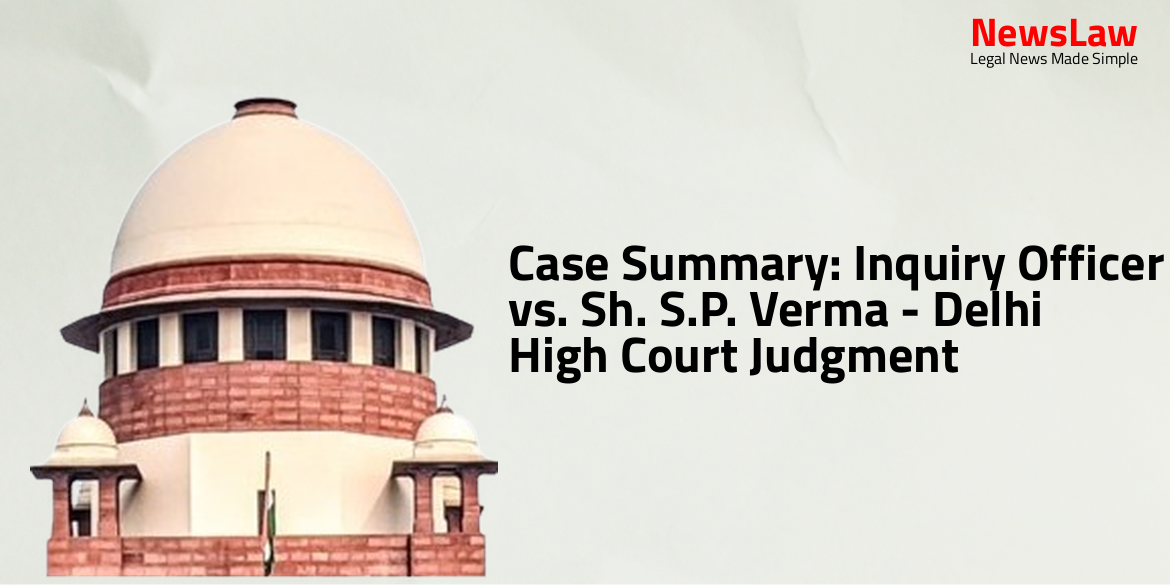In this context, we are called upon to determine the appropriate forum for adjudication and determination of violations of the Securities and Exchange Board of India (Substantial Acquisition of Shares and Takeover) Regulations, 1997, and Securities and Exchange Board of India (Prohibition of Insider hereinafter referred to as the ‘2013 Act’. Companies Appeal (AT) 240 of 2017 of the National Company Law Appellate Tribunal dated 06.12.2018 judgment of the National Company Law Tribunal (hereinafter referred to as the ‘Tribunal’), allowing the company petition filed by the Appellant under Section 111A of the Companies Act, 1956, (which is Section 59 of the 2013 Act), for rectification of Members Register. Respondent
Also Read: https://newslaw.in/case-type/criminal/alleged-misuse-of-official-position-courts-legal-analysis/
No 1 is also a listed company which is engaged in the business of producing carbon dioxide gas and dry ice. On 19.01.2004, Respondent No 1 acquired 600 equity shares of the Appellant and this resulted in the aggregate shareholding of the Respondents crossing 5% of the total paid-up share capital of the Appellant, thereby triggering Regulation 7(1) of the SEBI (SAST) Regulations. Four months later, on 27.05.2004, Respondent No 1 acquired additional shares of the Appellant, as a result whereof, its individual shareholding exceeded 5% of the total paid-up share capital of the Appellant. It is the stand of Respondent No 1 that the failure to issue a notice was not an Regulation 13 – (1) Any person who holds more than 5% shares or voting rights in any listed company shall disclose to the company in Form A, the number of shares or voting rights held by such person, on becoming such holder, within 2 working days of: (a) the receipt of intimation of allotment of shares; or (b) the acquisition of shares or voting rights, as the case may be. 24.08.2004, Respondent No 1 also wrote to the SEBI that its individual shareholding in the Appellant had crossed 5% on 27.05.2004 and that there was a delay in disclosing this to the Appellant. By its judgment dated 05.07.2017, the Tribunal held that the intimation dated 16.08.2004 is in violation of the SEBI (PIT) Regulations since the said declaration had to be filed within four working days of the receipt of intimation of allotment of shares or the acquisition of shares or voting rights, as the case may be.
In so far as the exercise of power under Section 111A of the 1956 Act is concerned, the Tribunal held that in case of violation of SEBI regulations, Section 111A empowers a company to apply for rectification, and in such cases, the Tribunal is entitled to pass an order to undo the mischief. The Respondents having furnished the declaration at a later point of time are hereby barred from exercising their rights as to the shares acquired by them in the Petitioner Company in excess of 5% the company is hereby authorised to buy back the shares that the Respondents hold in excess of 5% of the shareholding in the Company at the rate which was prevailing on the date of presentation of the Petition or market value, whichever is higher. The Appellate Tribunal, by its order dated 06.12.2018, allowed the appeal and set aside the order of the Tribunal. Chidambaram, learned Senior Advocate on behalf of the Appellant, contended that – (i) no timely intimation in the prescribed format was given by the Respondents when Regulation 7(1) of the SEBI (SAST) Regulations got triggered; (ii) Respondent Nos. Shyam Divan, learned Senior Advocate appearing for the Respondents, contended that – (i) filing of a petition under Section 111A is an abuse of process; (ii) there is no violation of the SEBI (SAST) Regulations as the Respondents had given a timely intimation in the prescribed format; (iii) the Section 111A Petition did not allege any violation of the SEBI (SAST) Regulations, and no attempt was made to make any amendment to the same; (iv) the SEBI (PIT) Regulations are not applicable to Respondent Nos. The reliefs claimed by the Appellant in its Company Petition under Section 111A of the 1956 Act is as under: – “(a) Declaration that the acquisition of shares of and in the company by the Respondent Nos.1 to 6 are illegal, null and void and of no effect; (b) Necessary directions be given for rectifying the records by deleting the names of the Respondents as owners of all shares of and in the company acquired by the Respondents; (c) Permanent injunction restraining the Respondents whether by themselves or their servants or agents or assigns or otherwise howsoever from exercising any rights or receiving any benefit in respect of the shares held by the Respondents in the company in any manner whatsoever; (d)……. The rectificatory powers of a Board/Company Court under Section 38 of the Companies Act, 1913, then under Section 155 of the 1956 Act, followed by Section 111A introduced by the 1996 Amendment to the 1956 Act, and finally, Section 59 of the 2013 Act, demonstrate that its essential ingredients have remained the same. (1) If the name of any person is, without sufficient cause, entered in the register of members of a company, or after having been entered in the register, is, without sufficient cause, Members of a company, or ( ii ) after having been entered in the Register, is, without sufficient cause, omitted therefrom; or (b) default is made, or unnecessary delay takes place, in entering on the Register the fact of any person having become, or ceased to be, a member: ” the person aggrieved, or any member of the company, or the company, may apply to the court for rectification of the Register. (3) The [Tribunal] may, on an application made by a depository, company, participant or investor or the Securities and Exchange Board of India, if the transfer of shares or debentures is in contravention of any of the provisions of the Securities and Exchange Board of India Act, 1992 (15 of 1992) or regulations made thereunder or the Sick Industrial Companies (Special Provisions) Act, 1985 (1 of 1986 ) or any other law for the time being in force, within two months from the date of transfer of any shares or omitted therefrom, or if a default is made, or unnecessary delay takes place in entering in the register, the fact of any person having become or ceased to be a member, the person aggrieved, or any member of the company, or the company may appeal in such form as may be prescribed, to the Tribunal, or to a competent court outside India, specified by the Central Government by notification, in respect of foreign members or debenture holders residing outside India, for rectification of the register. debentures held by a depository or from the date on which the instrument of transfer or intimation of the transmission was delivered to the company, as the case may be, after such inquiry as it thinks fit, direct any depository or company to rectify its register or records.] (4) The [Tribunal] while acting under sub-section (3), may at its discretion make such interim order as to suspend the voting rights before making or completing such enquiry. (4) Where the transfer of securities is in contravention of any of the provisions of the Securities Contracts (Regulation) Act, 1956, (42 of 1956), the Securities and Exchange Board of India Act, 1992 (15 of 1992) or this Act or any other law for the time being in force, the Tribunal may, on an application made by the depository, company, depository participant, the holder of the securities or the Securities and Exchange Board, direct any company or a depository to set right the contravention and rectify its register or records concerned. 4646(E)
dated 21.12.2020], the sub- section: “(5) If any default is made in complying with the order of the Tribunal under this section, the company shall be punishable with fine which shall not be less than one lakh rupees but which may extend to five lakh rupees and every officer of the company who is in default shall be punishable with imprisonment for a term which may extend to one year or with fine which shall not be less than one lakh rupees but which may extend to three lakh rupees, or with both.” 19.
There could be no doubt any question raised within the peripheral field of rectification, it is the court under Section 155 alone which would have exclusive jurisdiction. In case any claim is based on some seriously disputed civil rights or title, denial of any transaction or any other basic facts which may be the foundation to claim a right to be a member and if the court feels such claim does not constitute to be a rectification but instead seeking adjudication of basic pillar some such facts falling outside the rectification, its discretion to send a party to seek his relief before the civil court first for the adjudication of such facts, it cannot be said such right of the court to have been taken away merely on account of the deletion of the aforesaid proviso.
So far exercising of power for rectification within its field there could be no doubt the Court as referred under Section 155 read with Section 2 (11) and Section 10, it is the Company Court alone has exclusive jurisdiction…
But this does not mean by interpreting such “court having exclusive jurisdiction to include within it what is not covered under it, merely because it is clocked under the rectification nomenclature does not mean the court cannot see the substance after removing the cloak. Without sufficient cause entered or omitted to be entered means done or omitted to do in contradiction of the Act and the Rules or what ought to have been done under the Act and the Rules but not done. If it truly is rectification, all matters raised in that connection should be decided by the court under Section 155 and if it finds adjudication of any matter not falling under it, it may direct a party to get his right adjudicated by a civil court….” It is evident from the above that while interpreting Section 155, this Court has held that the power of CLB is narrow and can only consider questions of rectification. , held that even though Section 111(7) of the 1956 Act seemingly enlarges the power of the CLB, the power of rectification continues to remain summary in nature and if any seriously disputed questions arise, the Company Court should relegate the (2006) 6 SCC 94 (2016) 1 SCC 423 Section 111(7) – On any application under this section, the Tribunal – (a) may decide any question relating to the title of any person who is a party to the application to have his name entered in, or omitted from, the register; (b) generally, may decide any question which it is necessary or expedient to decide in connection with the application for rectification. Learned counsel’s argument that under Section 15Y the only jurisdiction conferred on an adjudicating officer is to penalise the party and not for rectification also cannot be accepted because the provisions of Section 15Y are to be read together with Section 20A of the SEBI Act which inter-alia confers a power on the board to pass any order which includes direction as contemplated under Regulation 44 of the Takeover Regulations….. I am of the opinion that on plain and simple reading of section 15Y read with section 20A of the Act all the cases arising out of the breach and Take Over Regulation must fall within the exclusive domain of SEBI and cannot be complained in the court of Law by virtue of express bar contained under section 15Y and section 20A of the SEBI Act. The allegations of violation of Takeover Code and Insider Trading is to be decided by the SEBI and similarly the allegations of investment beyond the limit under section 372A of the Act and acquisition of shares creating thereby a dominant undertaking under section 108A of the Act are to be investigated and crystallised/confirmed as violations by the Central Government. This is a precious right, and that is the reason why the Parliament found it necessary to caution that the provision of this Section shall not restrict the right of a holder of securities, to transfer such securities. There is another perspective in which the legality and propriety of the company petition under Section 111A for declaring the acquisition of shares as null and void for violation of SEBI Regulations could be judged – Which is the appropriate forum for adjudication and determination of violations and consequent actions under the SEBI (SAST) Regulations and the SEBI (PIT) Regulations?
Telecom Regulatory Authority of India, Insurance Regulatory and Development Authority, Insolvency and Bankruptcy Board of India, Central and State Electricity Regulatory Commissions and Airport Economic Regulatory Authority, are some of the regulators established under their respective statutes. , (2013) 1 SCC 1 (Para 298); Securities and Exchange Board of India v. Kishore R Ajmera, (2016) 6 SCC 368 (Para 25); Securities and Exchange Board of India v. Section 30, Securities and Exchange Board of India Act, 1992.
Chapter IV, Securities and Exchange Board of India Act, 1992.
The adjudicatory power also includes the Chapter VI-A, Securities and Exchange Board of India Act, 1992.
Also Read: https://newslaw.in/case-type/civil/courts-analysis-on-compliance-with-resolution-plan-conditions/
It is in this context, that the SEBI (SAST) Regulations and the SEBI (PIT) Regulations, with which we are concerned in this case, are to be understood. Regulation 14 provides that any person violating the said Regulations shall be liable for action under Sections 11, 11B, 11D, 24 and Chapter VI-A of the SEBI Act.
It is also important to note that the SEBI has the power under Regulation 11 to pass necessary directions to remedy an act of insider trading in order to have a complete and comprehensive control over the securities market. Chapter V deals with investigation and action by the Board, which includes the power of the Board to appoint an investigating officer (Regulation 38), the issuance of show-cause notice to the acquirer (Regulation 39), the obligation of the investigating authority to submit a report at the earliest (Regulation 41), the duty to supply the report to the acquirer and give him an opportunity of hearing before passing penal orders (Regulation 42) and lastly, the powers of the Board to take action/pass directions under Chapter VI-A and Section 24 of the SEBI Act (Regulation 44). Having considered the matter from a different perspective, we are of the opinion that the Appellant is not justified in invoking the jurisdiction of the CLB under Section 111A of the Act for violation of SEBI regulations.
Case Title: IFB AGRO INDUSTRIES LIMITED Vs. SICGIL INDIA LIMITED (2023 INSC 9)
Case Number: C.A. No.-002030 / 2019



